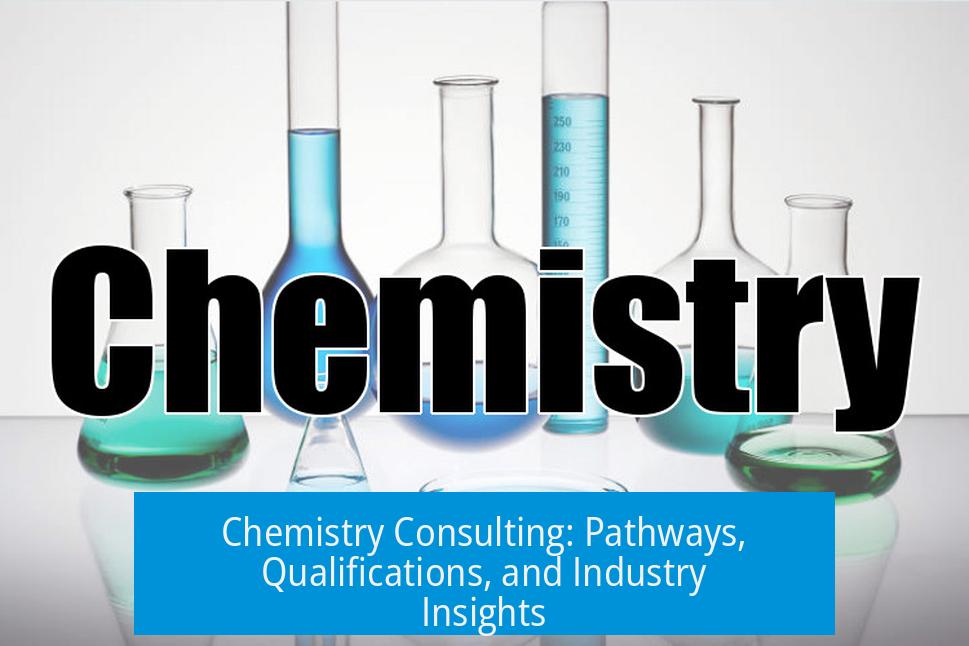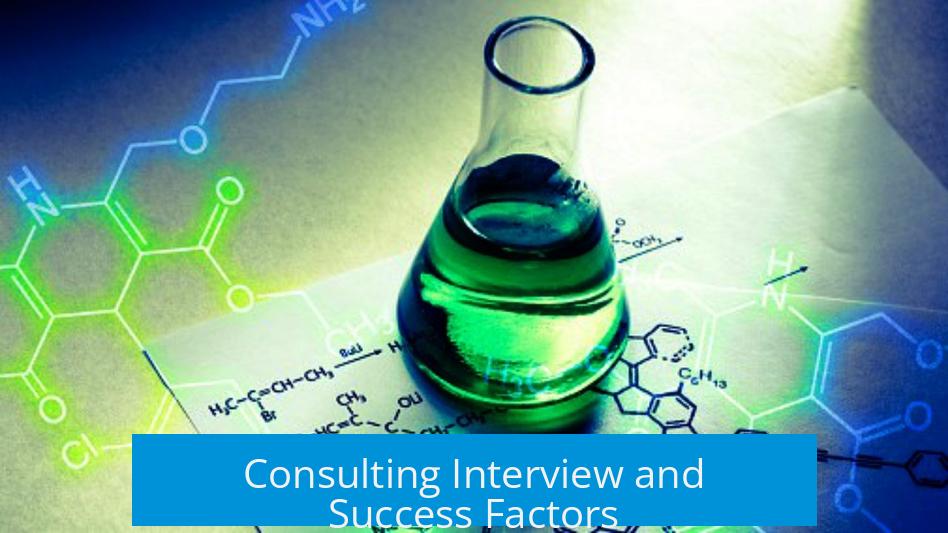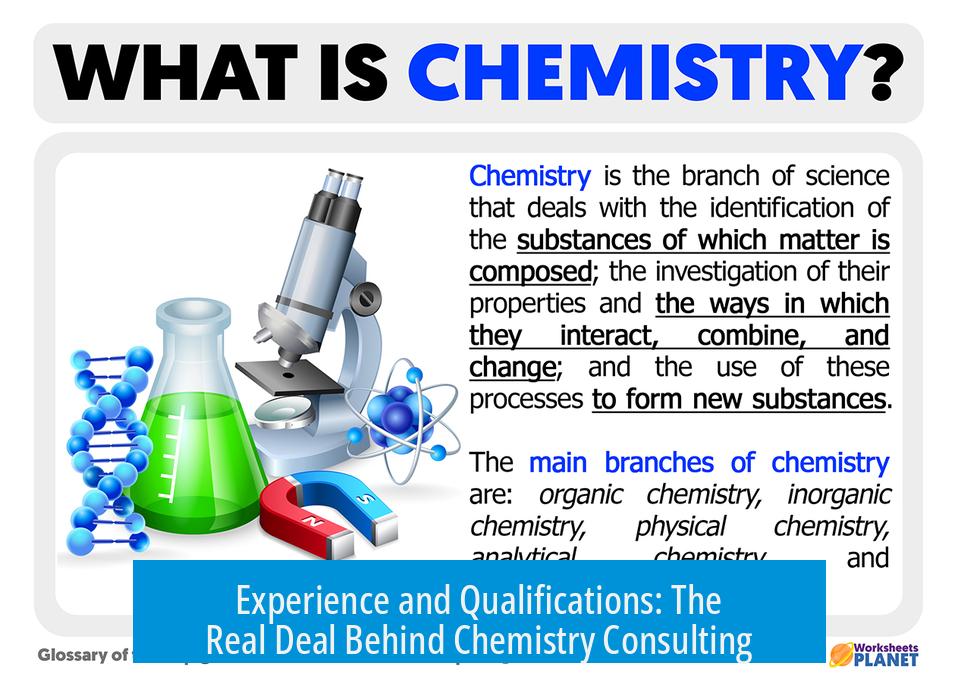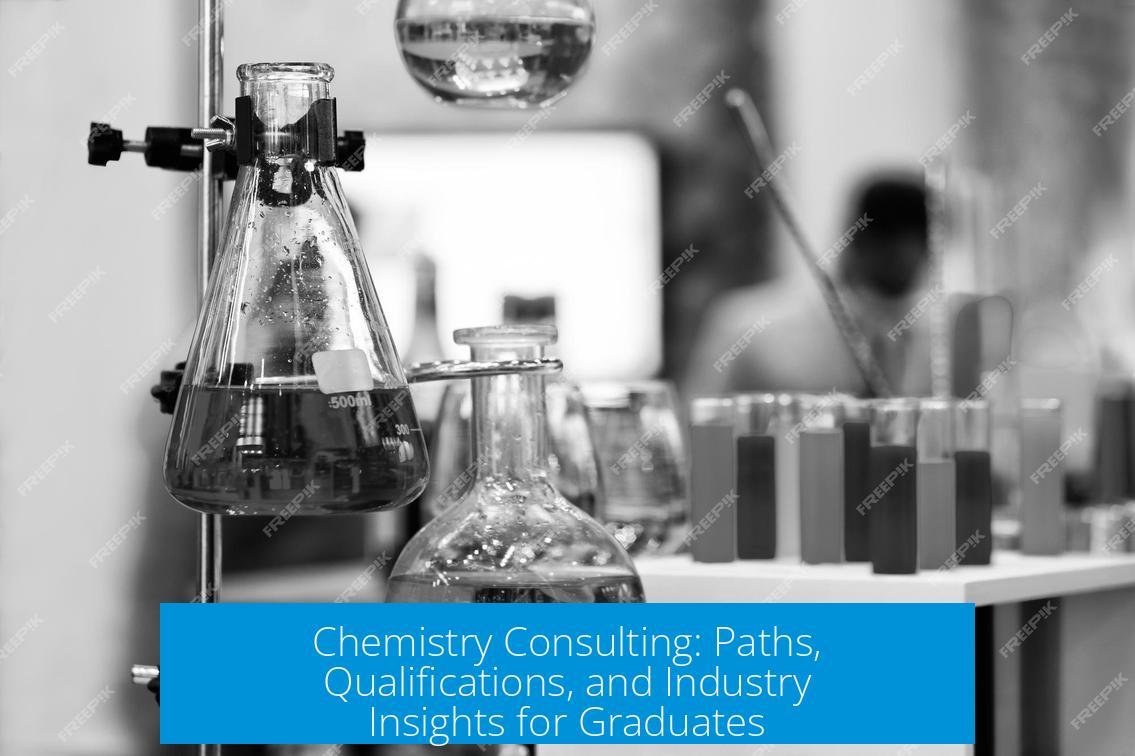Chemistry Consulting: Pathways, Qualifications, and Industry Insights

Chemistry consulting demands high levels of expertise, significant professional experience, and strong networks. It favors those with advanced degrees such as PhDs or Master’s and typically requires years spent working in specialized chemical roles before transitioning into consulting.
Experience and Qualifications Needed for Chemistry Consulting
Chemistry consulting is a field where practical, proven experience outweighs theoretical knowledge alone. Fresh graduates, especially those with only a bachelor’s degree, rarely qualify directly as consultants. Employers seek individuals who bring depth through “been there, done that” experience. The consensus from professionals in pharma and related industries highlights the following credentials and experience levels as typical prerequisites:
- Advanced degrees: PhDs or Master’s degrees in chemistry or related fields are standard minimums.
- Extensive work history: About 8-10 years in various chemical roles provide the necessary perspective.
- Professional networks: Strong industry connections often ease the entry into consulting roles.
- Special certifications: In the UK, the MChemA degree is a key qualification for certain consulting roles, such as “Public Analyst,” sometimes considered more valuable than a PhD in analytical chemistry contexts.
Simply possessing a bachelor’s degree in chemistry is insufficient for consulting, as it lacks sufficient preparation for complex, real-world problems faced by clients. Industry leaders emphasize that consultants need to bring credibility, especially when advising research, development, or manufacturing plants.
Pathways Into Consulting for Chemistry Graduates
Entry routes into chemistry consulting vary, often reflecting the evolving nature of consulting firms and their client demands. Several pathways exist for those holding chemistry degrees:
- Traditional consulting firms: Large consultancies like McKinsey may recruit through rigorous exams, valuing problem-solving ability and aptitude over degree specialization.
- Specialized chemistry/technical consulting roles: Those with PhDs combined with leadership and research experience often find roles here.
- Data analyst or technical roles: Graduates with computational chemistry or data skills sometimes enter consulting as quantitative analysts, leveraging their logical and analytical training.
- Tech consulting: Diverse chemistry backgrounds can lead to roles in IT or technology consulting through skills such as fast learning, creativity, and problem-solving.
Networking and demonstrating a blend of expertise and interpersonal skills often ease the process. For example, some consultants enter through smaller, niche consultancies where fit and adaptability matter as much as credentials. Experience in leadership roles and a portfolio of varied projects significantly benefit candidates.
Types of Consulting Related to Chemistry and Their Requirements
Chemistry graduates can specialize in several consulting sectors, each with specific expectations:
- Quality assurance consulting: Often in laboratories, food industries, or pharmaceuticals. This typically requires a solid background and industry experience.
- Pharmaceutical consulting: Consultants frequently hold advanced degrees and experience in drug development or clinical research.
- Management consulting with a chemistry focus: Less technical but requires a strong intellectual foundation and problem-solving skills.
The field chosen impacts how much experience and education is necessary. For example, advising chemical plants or specialized chemical companies usually demands deep subject matter expertise and often a Master’s or PhD degree. By contrast, management-oriented consulting places more emphasis on overall analytical and leadership abilities.
Consulting Interview and Success Factors

Success in chemistry consulting hinges on certain key factors:
- Initial client rapport: The client must like and trust the consultant from the outset.
- Building confidence: Demonstrating clear, knowledgeable answers during interviews helps build trust.
- Delivering measurable results: The consultant must translate advice into tangible outcomes for clients.
Preparation for interviews is critical. Candidates face challenging assessments, including responding to scenario-based questions and skill tests, sometimes on camera. Although degree background loses importance once candidates advance past screening, thorough preparation and strong communication remain essential. Experience enables these factors, but ambitious newcomers can find success by focusing on these areas.
Caveats and Warnings About Consulting in Chemistry
Chemistry consulting can be demanding. Consulting at large firms may entail long working hours, competitive environments, and high stress. Some caution against chasing roles at major firms if work-life balance is a priority. Other critics question the value consultants provide relative to their pay and accountability, urging chemists to seek roles that create direct, measurable impacts rather than just advising.
Industry voices emphasize practical outcomes over advisory roles. They encourage chemists interested in consulting to consider whether they want to “leave a mark” by contributing hands-on, or generate value through advice and client interactions.
Key Takeaways
- Chemistry consulting requires advanced education (Master’s or PhD) combined with years of relevant work experience.
- Strong professional networks and diverse project experience significantly improve consulting prospects.
- Typical consulting areas include quality assurance, pharmaceuticals, and management-focused roles.
- Interview success depends on building client trust, confident communication, and demonstrating results.
- Consulting can involve high workloads; candidates should weigh personal priorities carefully before pursuing.
Chemistry → Consulting: Cracking the Code to a Niche Career
What does it really take to pivot from a lab coat to a consulting suit in the chemistry world? You might picture fresh-faced graduates landing consulting gigs right after their bachelor’s but, trust me, that’s more fairy tale than fact. Chemistry → consulting is a path laden with experience, expertise, and a dash of networking magic.
Let’s dive deep into this fascinating crossover—exploring qualifications, pathways, types of consulting, interview tips, and warnings.
Experience and Qualifications: The Real Deal Behind Chemistry Consulting

Buying consulting advice from someone who just “graduated” is like trusting a snake oil salesman — enthusiastic, but unproven. In pharma and other chemistry-heavy industries, consultants need to have “been there, done that.” You’re not getting hired as a chemistry consultant straight out of your bachelor’s degree.
Why? Because a BS in chemistry doesn’t prepare you to consult confidently. It’s important to have a minimum of a master’s degree or a PhD. A chemistry consultant’s education is more than just exams; it’s a signal of deep knowledge and credibility. Especially in the UK, there’s the MChemA degree, prized for analytical chemists eyeing “Public Analyst” titles. Getting that qualification along with years of relevant experience often trumps even a PhD.
Most chemistry consultants have several jobs behind them—diverse roles that build both expertise and a network worth tapping. You need both to be a respected consultant.
How Do Chemistry Graduates Break Into Consulting? Spoiler: It’s Not a Walk in the Park.
Pathways into consulting are varied but none are exactly “easy.” One successful consultant shares their recipe: PhD + solid leadership + extensive work experience + a professional network willing to vouch for you. No shortcuts here.
Big consulting firms, like McKinsey, often ignore your major entirely and instead whip out exam-based assessments. So a chemistry graduate might find spots here, but you better be ready. These interviews are famously tough.
Surprise! The tech and data analyst side welcomes chemistry grads, especially those with computational chemistry backgrounds. Logical thinking and a knack for quick learning can open doors. One tale involves a PhD in physical chemistry who bagged an IT consulting job before defending their thesis. How? By selling creativity, adaptability, and teamwork rather than experience.
Another strategy is starting early through data analyst roles. These can serve as foot-in-the-door positions in consulting firms — even if your chemistry knowledge isn’t on full display yet.
What Types of Chemistry-Related Consulting Are Out There?
Consulting isn’t a monolith. The type you want to pursue greatly shapes your journey.
- Quality Assurance Consulting works well for those with lab experience in pharmaceuticals, food, or analysis. Not fresh out of college folks, but seasoned pros.
- Chemical Industry Consulting requires you to specialize and have significant industry experience or higher qualifications.
- Bio-pharma Consulting usually seeks expertise in the biosciences, making a master’s degree a minimum barrier.
- Management Consulting is a wildcard: firms want bright minds, often at the cost of an “unhealthy work-life balance.”
So, where does chemistry fit? Areas that demand your specific expertise lean heavily on your education and career background. Meanwhile, broader consulting areas value problem-solving skills that a chemistry degree sharpens.
Nailing the Consulting Interview: More Than Just a Pretty Degree
Landing a consulting role is part science, part art. The essentials break down into three keys:
- Make a good first impression—clients or employers have to like you instantly.
- Build their confidence during interviews by showing you understand their needs and can help solve problems.
- Deliver real results or enable your clients to do so.
Here’s the kicker: without past consulting experience, this is tough. But not impossible.
Preparation is crucial. Candidates often face strange scenarios, like speaking into a camera with no audience, answering skill questions, or performing under strict pressure. Even after an assessment center, your degree may not carry you unless your interview answers shine.
The Real Talk: What Consulting in Chemistry Might *Really* Feel Like

Heads-up: this world isn’t all champagne and breakthroughs. Some whisper wariness about the consulting lifestyle—especially at the big players like PWC, EY, McKinsey, and Deloitte. The hours can stretch to 80/week or more, which often sparks complaints about burnout.
Also lurking is skepticism about consultants giving advice without accountability—the infamous “twice the pay for twice the opinion” gripe. Some argue companies would do better investing in training their own staff rather than shelling out for external advice.
So why venture into chemistry consulting at all? Because you want to leave a mark, add value, and maybe, just maybe, shake up some industries with your unique blend of science and strategy.
Bringing It All Together: Your Action Plan to Chemistry Consulting Success
Wondering how to start? Here’s a straightforward guide:
- Upgrade Your Education: Aim for a master’s or PhD to build both expertise and credibility.
- Gain Diverse Experience: Work in different roles across the chemical or pharma industries. Lab work, quality assurance, R&D, and management all count.
- Network Constantly: Consultancies often hire through referrals and internal recommendations.
- Explore Adjacent Roles: Data analysis or tech consulting can be stepping stones.
- Prepare Thoroughly for Interviews: Practice case studies, behavioral questions, and non-traditional formats like video interviews.
Remember, consulting is as much about problem-solving and client relationships as it is about your chemistry knowledge. Are you ready to bring both to the table?
Final Thought
Chemistry → consulting is not a linear path. It demands education, experience, networking, and resilience. But it offers a fascinating career where your scientific acumen meets strategic problem solving. So, if you’re serious about this blend of science and business, buckle up and start charting your course today. Your consulting clients await.
What qualifications are needed to become a chemistry consultant?
Most chemistry consultants have a PhD or a Master’s degree. A bachelor’s degree alone is usually insufficient. Years of practical experience in various chemical roles are often required.
How can chemistry graduates enter consulting firms?
Graduates often enter consulting through a mix of advanced degrees, relevant work experience, and strong professional networks. Some start in data analyst roles before moving into consulting.
What types of consulting careers exist for chemistry professionals?
Chemistry consultants work in areas like quality assurance, pharmaceuticals, food industry, and sometimes management consulting. Experience in the specific sector is typically necessary.
What makes a successful consultant interview in chemistry-related consulting?
Building client confidence and demonstrating relevant skills during the interview are key. Preparation and effective communication often outweigh the candidate’s degree.
Are there challenges specific to consulting in chemistry?
Yes. Some big firms demand long working hours and can be highly competitive. Experience is crucial, and fresh graduates often struggle to meet expectations.





Leave a Comment